Turn signals (indicators) are legally required on every Toyota Prius.
It’s a safety instrument both for you and others on the road. If you drive your Prius without an indicator light, police will give you a ticket.
This article will discuss why your Prius’s turn signal is not working and the diagnosis and its working fix.
There are two ways you will understand your Prius’s turn signal not working.
- When you put left or right indicators, you will hear a fast clicking sound.
- On some models, no sound will come out of the dash speaker.
Let’s first observe the turn signal wiring diagram for the Toyota Prius below —
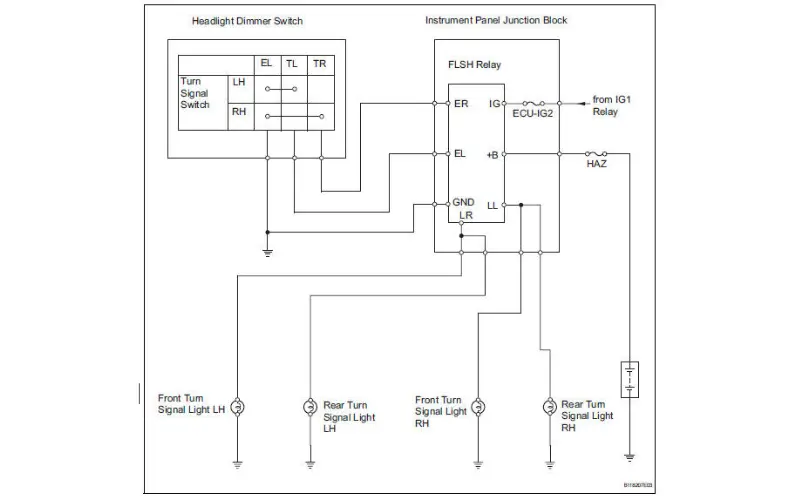
The instrument panel junction box controls all the four turn signals — front left, front right, rear left, and rear right. However, the junction box isn’t directly connected to the lights. Some fuses protect these lights from surge currents.
Please turn on the hazard lights in your Prius. All the four turn signals should flash. Now go out of your vehicle, observe each bulb, and isolate our non-working turn signal.
If only one turn signal bulb is not working, then our fix is easier than if two turn signals on the same side — drivers or passengers — don’t work.
From the above wiring diagram, we can see that all of the four turn lights are controlled by different wires.
Here are the reasons why the indicators are not working and its fix.
Turn Signal Bulb Have Burnt Out
One of the primary reasons the Toyota Prius indicators are not working is that the lights have gone out.
Depending on the model, Toyota uses either halogen or LED light bulbs. Even though LEDs last longer than halogen bulbs, both will eventually fail due to aging.
If the lights have gone out, the fix is easy. We have to replace the bulb.
Replacing the turn signal bulb is easy. However, if you don’t feel comfortable doing some DIY, please take your Prius to a Toyota service center or your trusted auto mechanic shop.
The cost to replace the turn signal lights at a Toyota service center typically costs $70, but at your local mechanic shop, it would cost $20-$30.
However, replacing the bulb is straightforward.
Toyota Prius has the following specifications for turn signal bulbs:
- Front turn signal bulb No. 7444NA, W 28/8, Type B (Amber)
- Rear turn signal bulb No. WY21W, W 21, Type B (Amber)
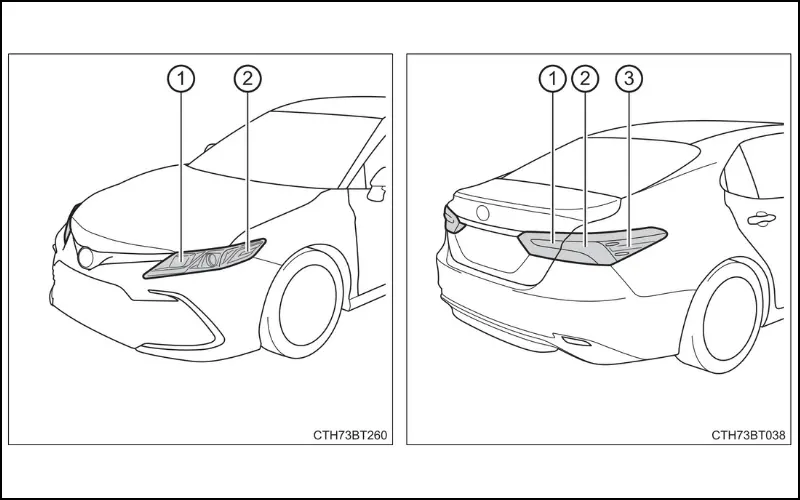
The above image shows the turn signal bulb position in the lighting assembly in Toyota Prius.
Front Locations:
- Front turn signal
- Front side marker lights
Rear Locations:
- Backup-lights
- Rear turn signal lights
- Rear side marker lights
At the end of this article, we have described an in-depth, step-by-step guide on replacing the turn signal bulb on Toyota Prius.
Fuse Has Blown Out
If you see that multiple turn signal bulbs in your Toyota Prius aren’t working, the hazard lights are not working at all, or no sounds are coming while you put left or right indicators, your turn signal fuse has gone out.
There are two fuse boxes on a Toyota Prius. One is inside your vehicle below the steering wheel column. Another is outside of the Prius in the engine compartment.
The inside fuse box typically controls all the lighting and electricals that are inside your Prius.
The engine compartment fuse box controls all the lights, alternators, starters, spark plug ignition, turn signal, and other electricals outside the Prius.
“HAZ” Fuse
In the Toyota Prius, the image below shows the fuse box. Typically it’s on the right side of the vehicle in the engine compartment, but on some models, it could be on the left side. The fuse box should have the writing “Fuse & Relays.”
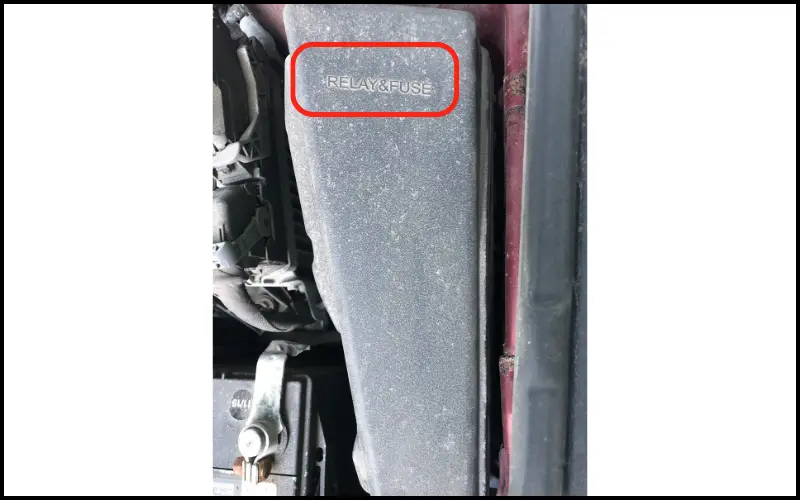
Open the fuse box. There you can see a lot of fuses and relays.
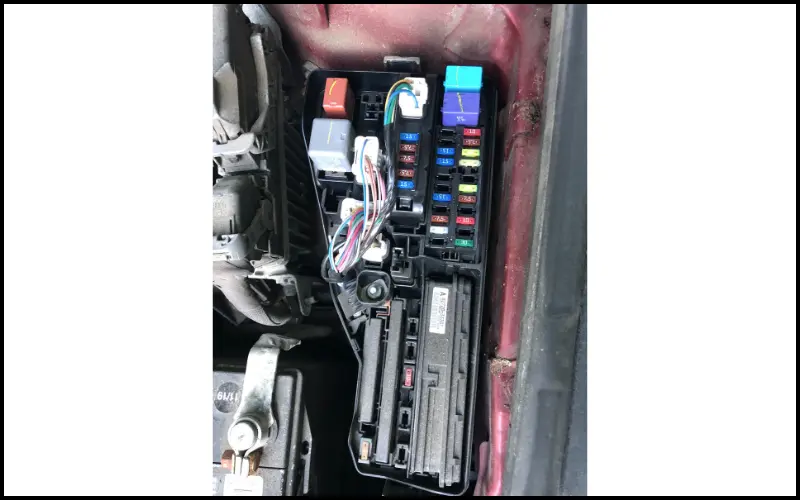
On the back of the fuse box cover, there’s a layout diagram that shows which fuse and relay control what. Locate the “HAZ” fuse (Hazard). Typically it’s a 15A fuse.
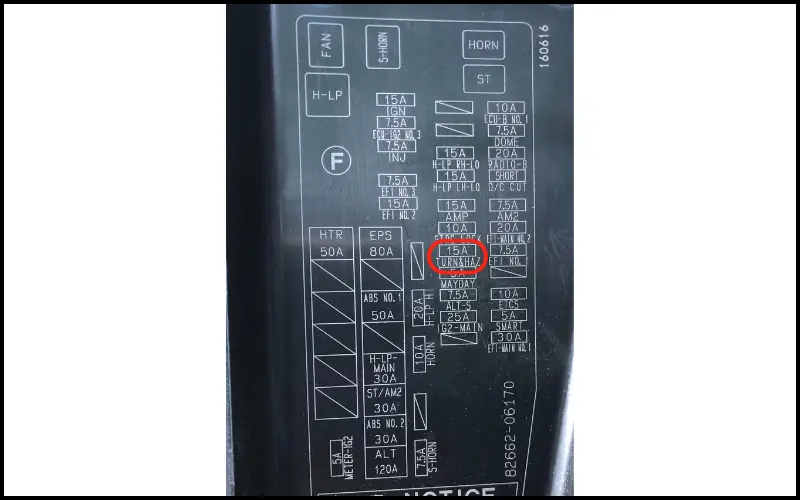
Pull the fuse out and observe it.
The image below shows what a blown-out fuse would look like. If your Toyota Prius’s turn signal fuse has blown out, please replace it with a similar amperage fuse (typically 15A).
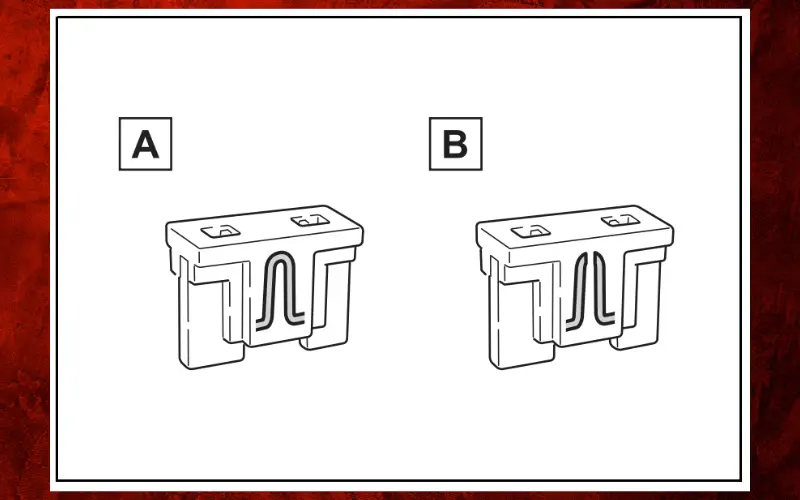
After replacing it, your indicators should start working.
If you don’t have a fuse handly, here’s a quick diagnosis that will confirm whether the fuse is the primary source of the problem.
Put the key in your Prius and turn on all electricals. But don’t turn on the engine.
Now, on the fuse box, remove the “HAZ” fuse and replace it with another same amperage fuse from another location in the fuse box.
Now, turn on the left turn signal first. Then the right turn signal.
If the new fuse makes your turn signal work again, it proves your “HAZ” fuse was the primary source of the problem.
However, if the test Fuse blows out immediately, there is a short circuit along the indicator wire, or one of the indicator bulbs is bad and pulling too much power.
If it doesn’t blow out, put the working fuse in its original location and buy a fuse from Walmart, NAPA, or Autozone. You can order fuses from Amazon too.
“GAUGE NO. 1” fuse
If the “HAZ” fuse is okay, please check the “GAUGE No. 1” fuse. It’s inside of your Prius fuse box below the steering wheel. If it’s blown out, change it with a similar amperage fuse.
Please remember that if the fuse has blown out, the problem isn’t the fuse but something else. Probably the bulb is drawing more current than required. It’s why it causes the fuse to blow out.
In this case, not only the fuse, but we also have to change the turn signal bulb in the Toyota Prius.
Wiring Issue
Have you recently been in a minor accident that pulled your front bumper or rear light assembly outward?
Sometimes, a minor tug on the bumper pulls the lighting connection. The wire connecting to a Toyota Prius’s turn signal is flimsy and breaks easily.
If the lights have not burnt out, the fuse is okay; possibly, the wire that connects the turn signal bulb has broken in some place.
Moreover, these wires are fragile and can break easily for various reasons.
Emergency Flasher Switch Is Broken
It’s rare, but sometimes the hazard switch can get damaged due to age. If the left or right turn signal is working, but the four-way flasher isn’t working, you need to change the hazard switch.
You can buy the switch on either eBay or from a junkyard and change it yourself. Alternatively, you can take your Prius to a Toyota service center.
Turn Signal Lights Assembly Got Damaged
The turn signal lights don’t always stay on. Still, these lights get hot and can damage the socket. Moisture and water can also cause short circuits.
In some situations, a damaged light socket could also be the source of the problem for a non-working turn signal.
While changing the indicator bulb, please observe the socket for any possible damage. Please take your Prius to a Toyota service center if there is any damage because we need a new turn signal socket.
Turn Signal Assembly Damaged
It’s rare, but in some cases, probably the entire turn signal controller on the steering wheel may not be working, which in turn makes the turn indicators not work.
If all the lights — turn signal, daytime running lights, headlights, high beams — aren’t working, your turn signal assembly on the steering wheel column has been somehow damaged.
If this happens, you must immediately take your Prius to the nearest Toyota Service center. It’s a safety hazard to drive without lights, especially at night.
How to Replace Toyota Prius Front Turn signal Step by Step Guide
Here’s the step-by-step guide to replacing the front turn signal bulb on Toyota Prius.
Turn off your Prius and remove the key. Please don’t replace the bulbs while the turn signal is on.
Please turn the steering wheel to one side for enough working space, as shown in the image below. Turn the steering wheel to the right when changing the left indicator bulb, and turn the steering wheel to the left when changing the right indicator bulb.
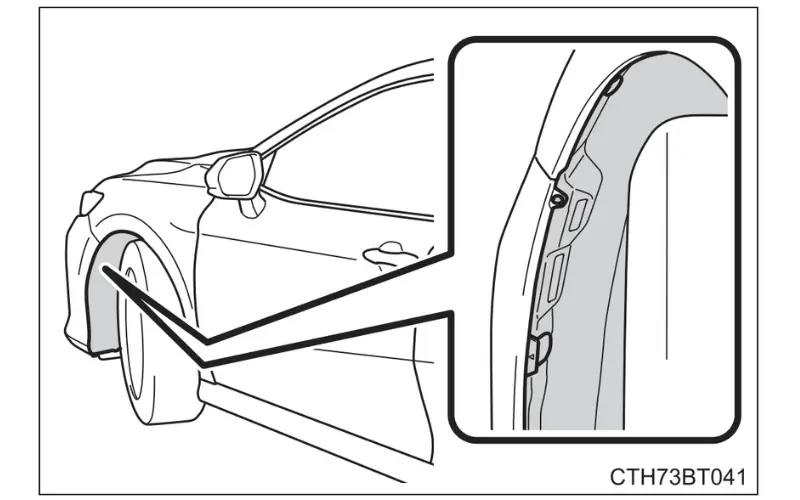
Remove the fender liner clips with a flathead screwdriver, as shown below. Please be careful; these clips are made of plastic and break easily.
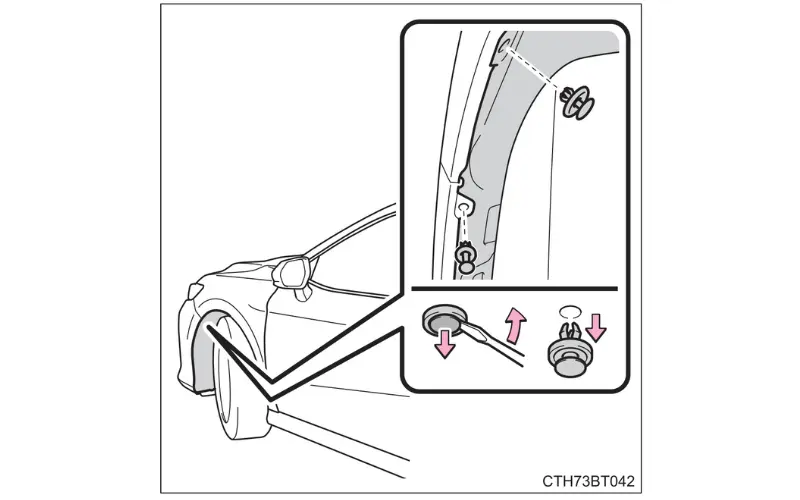
Insert the flathead screwdriver between the fender liner and front bumper at the triangle marker, as shown in the image below.
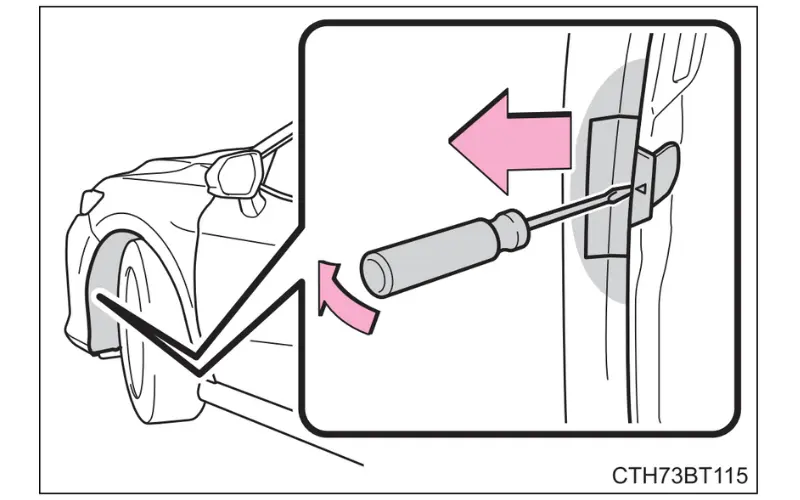
Then pull the fender liner outward, as shown in the image below. Turn the bulb base counterclockwise.
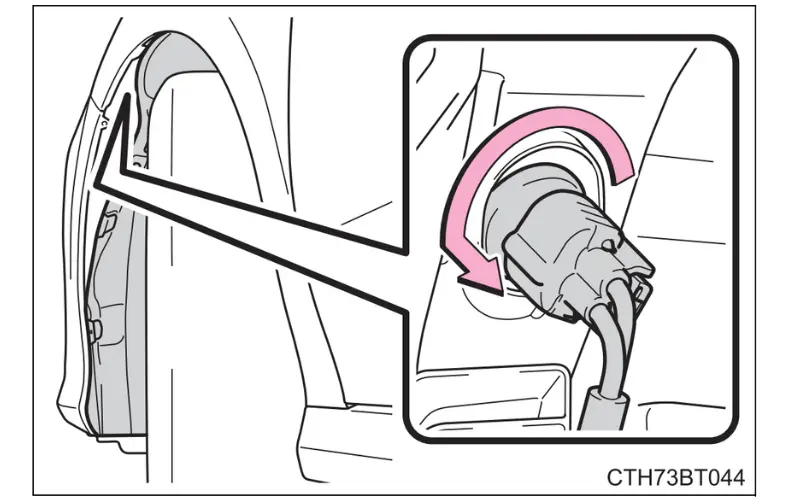
Pull the turn signal bulb, and replace it with a new one. Then put the turn signal socket back into the lighting assembly by clockwise motion.
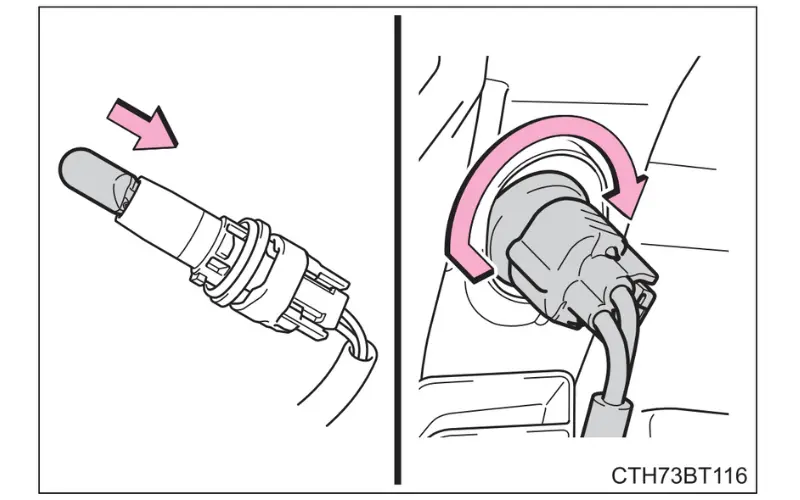
Return the fender liners to their original position and install the plastic clips we removed in the first steps.
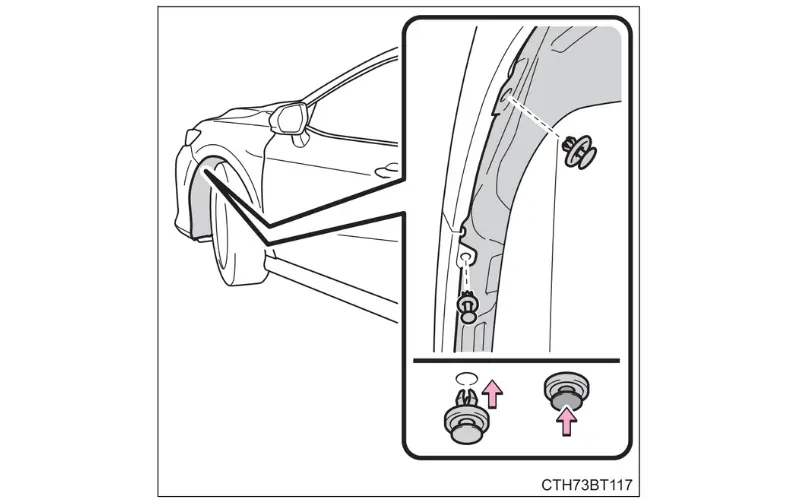
How to Replace Toyota Prius Rear Turn signal Step by Step Guide
Here’s the step-by-step guide to replacing the rear turn signal bulb on Toyota Prius.
Open the trunk. Take a flathead screwdriver and pry open the cover that protects the light unit. Now pull the cover outward.
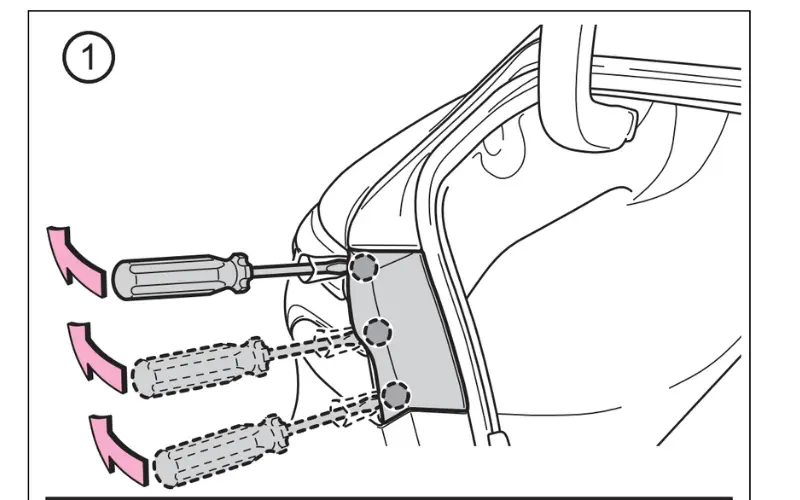
Remove the two bolts that secure the rear light assembly. Bring out the assembly carefully, and don’t let it go. There are thin wires which may break if you let them loose.
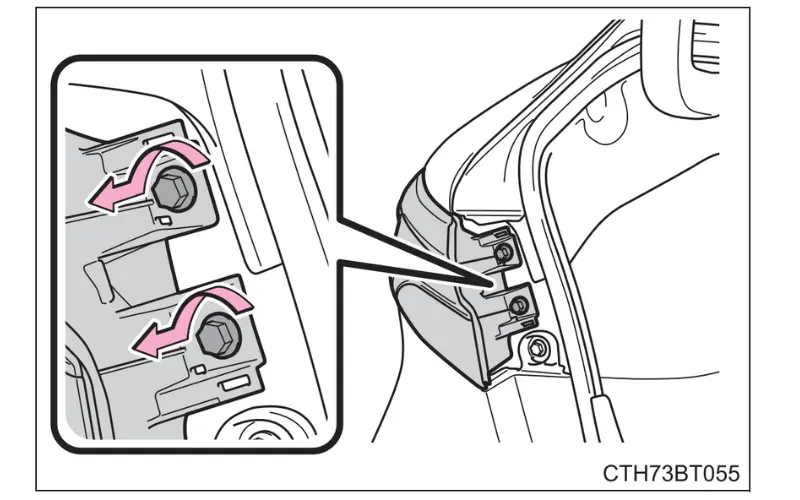
The first bulb from the left is the turn signal bulb, as shown in the image below. Rotate it counterclockwise and pull outward.
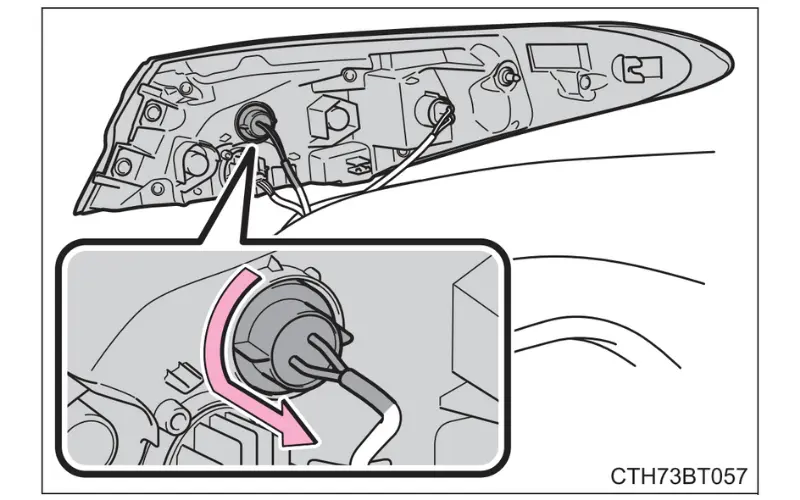
Pull the bulb outward and replace it.
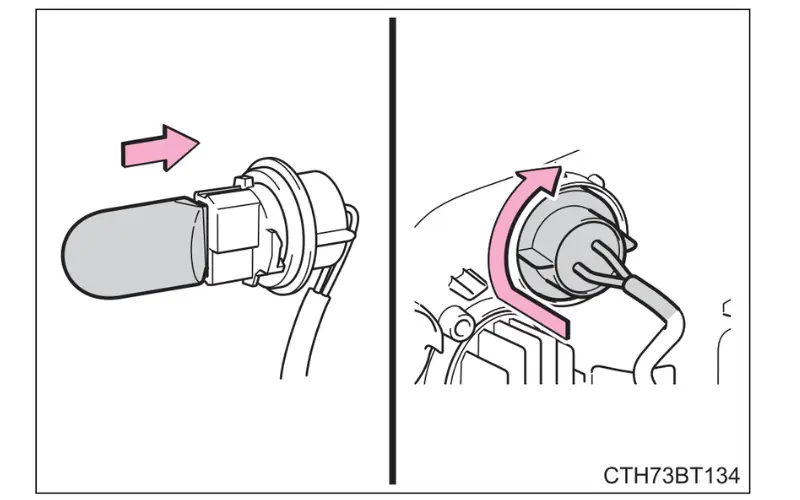
After installing the turn signal bulb assembly, install the two bolts.
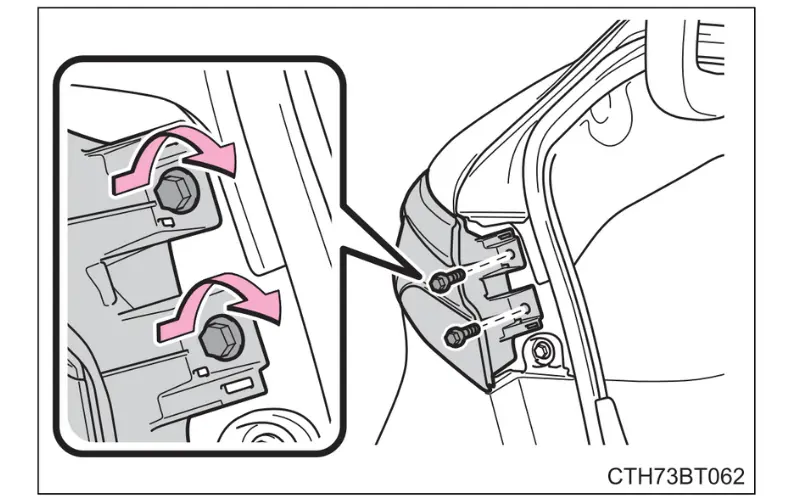
Install the cover as shown below.
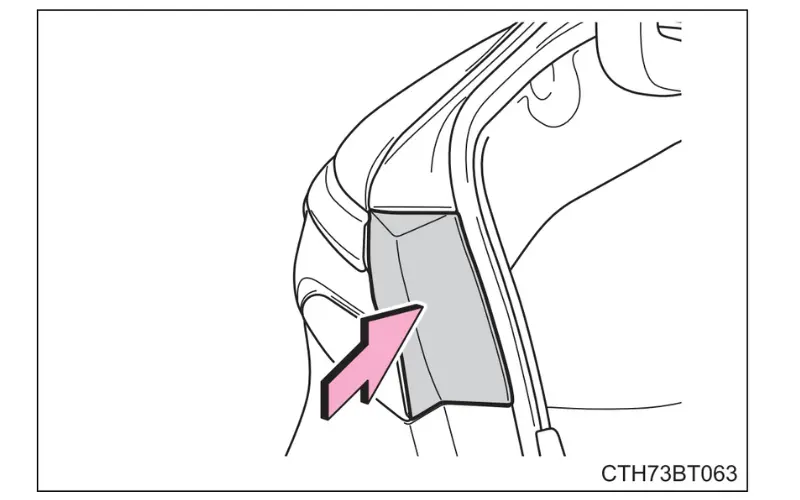
How do I know if the blinker fuse in my Toyota Prius is bad?
You can quickly diagnose whether the turn signal fuse has blown out. If all the turn signal lights are not working, it means the blinker fuse has gone out.
The fuse is in the engine compartment fuse box. Typically it’s a 15A fuse, and you can purchase it from Walmart, AutoZone, Advance Auto Parts, or NAPA.
What Causes the Turn Signal on Toyota Prius Stop Working?
The primary reason for having a non-working turn signal in Toyota Prius is the indicator bulb has burnt out, or the fuse has blown out.
If one of the turn signals is blinking very fast or making a fast clicking sound, one of your indicator bulbs has gone out.
How much does fixing the turn signal on a Toyota Prius cost?
Changing the turn signal bulb or fuse in your garage would cost less than $5. The fuse and indicator bulbs are cheap and sold at all auto shops such as NAPA, Walmart, or Autozone.
However, if you don’t want to change the turn signal bulb, it would cost around $70 at a Toyota service center or $20-$30 at roadside auto shops.